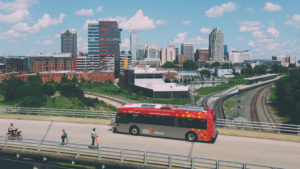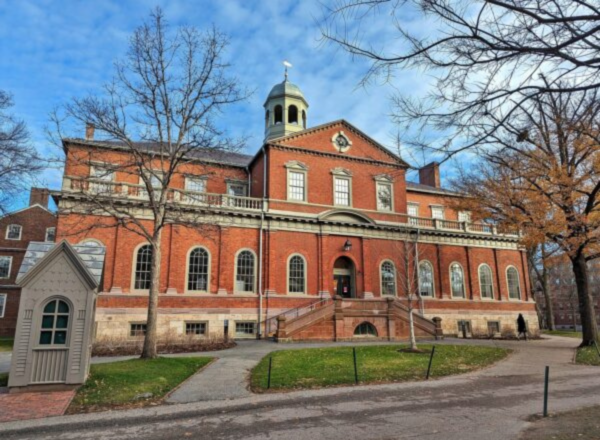Transit evolution: From commuter rail to green buses and community engagement
Writer: Eleana Teran
 September 2023 — Transit focused development has been a focal point for the Triangle over the past several years. While dreams of a comprehensive commuter rail system remain largely unfulfilled, significant strides have been made in other areas of transit development.
September 2023 — Transit focused development has been a focal point for the Triangle over the past several years. While dreams of a comprehensive commuter rail system remain largely unfulfilled, significant strides have been made in other areas of transit development.
The Research Triangle Regional Public Transportation Authority, or GoTriangle, recently completed a feasibility study that envisioned passenger trains running along a 37-mile existing railroad corridor between key areas such as Durham, Research Triangle Park, Cary, Raleigh and Garner. With an estimated cost exceeding $3 billion and a lack of federal backing, realizing this rail dream has been challenging.
While the project was first proposed in 2019, the commitment to this ambitious rail project remains alive, especially in Durham and Wake counties, which have set aside substantial funds for its realization. Wake County has set aside $1.2 billion while Durham has allocated $195 million for capital costs. However, there has been a shift in focus, with “regional rail” being the new terminology after the pandemic altered commuting patterns.
At the same time, the region is also focusing on expanding bus rapid transit (BRT). Perceived as economically efficient and inherently flexible, BRT is gaining traction in the region’s transit plans. For instance, the Wake Transit Plan outlines building four BRT lines from downtown Raleigh. Moreover, Chapel Hill Transit is planning an 8.2-mile BRT line by 2026. Notably, GoTriangle is also considering BRT routes that would connect local systems across counties.
Eric Curry, chief communications officer of GoTriangle, elaborated, “As the agency that plans and provides regional bus service in the Triangle, GoTriangle is well positioned to lead an effort integrating local plans for bus rapid transit with a regional network of bus rapid transit and express bus services. A successful regional BRT and bus study will align with planning efforts across the Triangle that aim to encourage transit-supportive land use, especially the development of more densely populated job centers and affordable housing near transit. A regional network of BRT could include dedicated transit lanes, transit signal priority, signature stations with passenger-focused amenities and other transportation infrastructure that supports fast, reliable, easy and equitable rapid transit service. As we develop a vision for a truly regional rapid transit system, GoTriangle will continue to work with its partners on complementary efforts such as the Freeway, Arterial, Street and Tactical (FAST) Transit Priority Infrastructure Study led by NCDOT and the bus speed and reliability study planned by DCHC MPO and we will build off of early success in Wake and Orange Counties regarding the planning, design and construction of BRT.”
GoTriangle received a substantial boost for their bus services with a $1.672 million grant from the Federal Transit Administration. This fund aims to support the electrification of the bus fleet by purchasing charging equipment and modernizing bus facilities. The investment aligns with GoTriangle’s sustainable approach to transit, marking a significant stride toward a greener Triangle region.
The agency is also deeply committed to fostering inclusivity and making transit more accessible to everyone. Initiatives such as job opportunities in English and Spanish, engaging with communities through events and partnering with organizations like Habitat for Humanity of Wake County reflect a broader vision of bridging the information gap.
“At GoTriangle, we see reaching out to underserved and minority communities as our responsibility,” Curry told Invest:. “Transit connects people to jobs, education, healthcare, affordable housing and other essentials of life. We hope the long-term impact of our efforts will help create a Triangle region where everyone can access the opportunities they need for the quality of life we all deserve.”
The GoPerks incentive program is a testament to their commitment. The program rewards eco-friendly commuters with incentives from local businesses, with an emphasis on supporting minority and women-owned businesses. As per Kim Johnson, GoTriangle’s Commuter Programming Consultant, more than 50% of the businesses involved in GoPerks have met this inclusion target since 2020.
The organization feels confident in its ability to ensure sustainable growth. Curry told Invest:, “As a leader in regional mobility, GoTriangle is well-positioned to connect all points of the region with fast, reliable and accessible transportation options, including regional bus and shuttle service, paratransit services, ridematching and vanpools. In addition to providing these services for our region, GoTriangle also serves the region as a resource for the planning efforts of our partners. Many of our partners have the authority to plan for various land uses within their jurisdictions and as we grow together as a region, GoTriangle will continue to support the implementation of transit-supportive planning policies.”
For more information visit:













